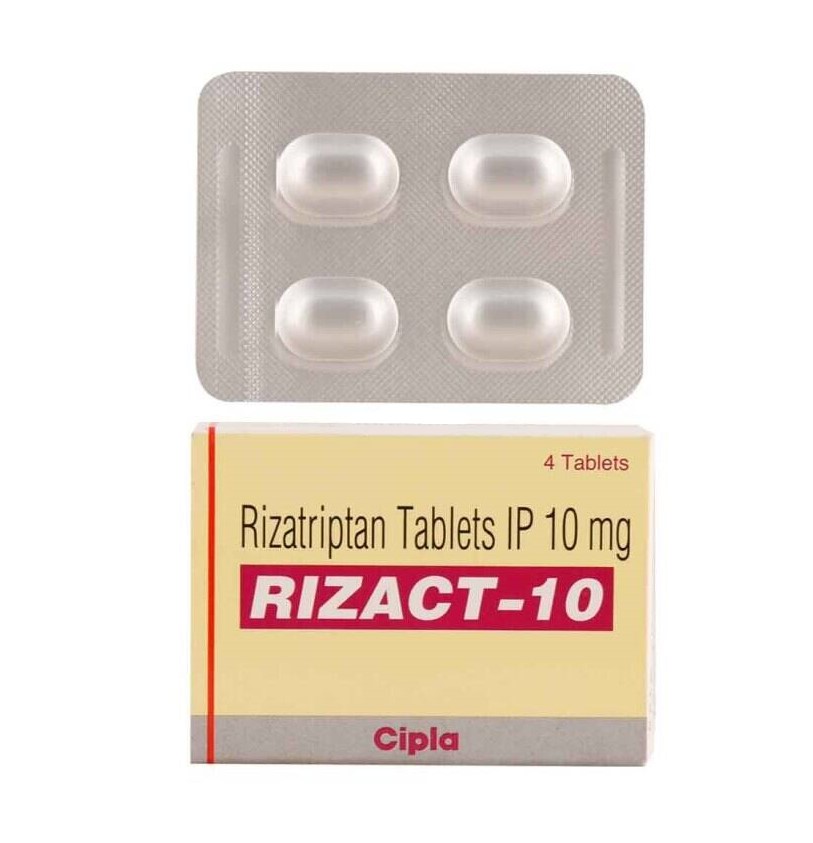Description
Rizatriptan (Maxalt – Rizact) 10 mg tablet is a selective agonist of serotonin (5-hydroxytryptamine; 5-HT) type 1B and 1D receptors used to treat migraine headaches. It helps in reducing pain and other symptoms associated with a migraine headache.
Drug = Rizatriptan
Strength = 10 mg
Manufacturer = Cipla
Quantity per sleeve = 4 Tabs (for the price quoted)
How To Take Rizatriptan (Maxalt – Rizact) 10 mg Tablet
This medicine may be taken with or without food.
Rizatriptan is available in tablet and orally disintegrating tablet.
If you have been given an orally disintegrating tablet, place the tablet on the tongue and allow it to dissolve and be swallowed with saliva.
Take Rizatriptan only when you have a migraine attack. Do not take this medicine if you do not have a migraine attack.
Do not take more than 10 mg of Rizatriptan in a 24-hour period.
Take Rizatriptan exactly as directed by your doctor or according to the instructions on the label. Do not take more or less than instructed by your doctor.
Dosage of Rizatriptan (Maxalt – Rizact) 10 mg Tablet
Acute migraine attacks: Initial: 5 or 10 mg as soon as possible after onset, repeat after 2 hours if significant relief is not attained. Maximum: 20-30 mg/24 hours.
Missed Dose of Rizatriptan (Maxalt – Rizact) 10 mg Tablet
If you often forget to take your medicine, let your doctor and pharmacist know.
Take the missed dose as soon as you remember. If it is almost time for your next dose, skip the missed dose and return to your usual dosing schedule.
Do not double a dose under any circumstances.
Overdose of Rizatriptan (Maxalt – Rizact) 10 mg Tablet
Signs of overdose may include the following:
- Hypertension
- Cardiovascular symptoms
Seek medical help immediately.
Contraindications
People with the following medical conditions should not take Rizatriptan:
- History of myocardial infarction
- Peripheral vascular disease
- Transient ischemic attack
- Ischemic heart disease or Prinzmetal’s angina
- Uncontrolled hypertension
- Basilar or hemiplegic migraine
- Severe hepatic or renal impairment
- Adolescent less than 18 years old
Side Effects
Rizatriptan may have the following side effects:
- Increased blood pressure
- Chest pain
- Palpitation
- Skin flushing
- Dyspnea
- Nausea
- Abdominal pain
- Dry mouth
- Dizziness
- Drowsiness
- Fatigue
Potentially Fatal:
- Toxic epidermal necrolysis
Warnings of
Do not use in people with the following conditions Rizatriptan:
- Severe liver disease
- Severe kidney disease
- Severe or uncontrolled high blood pressure
- Heart disease
- History of stroke
- Blood circulation problems
Inform your doctor and pharmacist if you are taking any of these medicines:
- Almotriptan
- Eletriptan
- Naratriptan
- Zolmitriptan
- Ergotamine
- Methysergide
- Monoamine oxidase inhibitors
- Propranolol
- Clomipramine
- Doxepin
- St John’s wort
Always notify the doctor and pharmacist if you are taking any other medicines, including herbal tonics such as traditional Chinese medicines, supplements and medicines that you buy without a prescription.
This list does not include all medicines that may interact with Rizatriptan.
How Does It Work?
Rizatriptan is a selective serotonin (5-HT1) agonist acting in the cranial arteries which is responsible for vasoconstriction and reduction of inflammation associated with antidromic neuronal transmission.
Uses
Rizatriptan is used to treat the following conditions:
- Acute migraine attacks
Special Precautions and Connected Warnings
Take special precautions if you have the following conditions:
- Elderly
- Mild to moderate hepatic or renal impairment
- Coronary artery disease
- Pregnancy
- Lactation
- Drowsiness
- History of seizures
- Avoid food additives
- Avoid alcohol
Storage Conditions
- Store at 15-30°C.
- Store in a cool, dry place away from the reach of children.
- Do not use Rizatriptan that is expired or out of expiry date.


